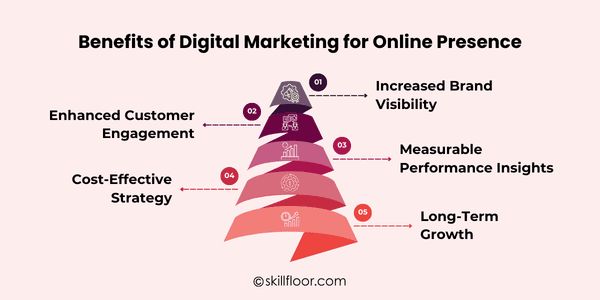The Role of Digital Marketing in Building Online Presence
Discover how digital marketing transforms businesses’ online presence, boosts visibility, and creates lasting connections in today’s competitive digital world.

Just consider the past ten years. Word-of-mouth, newspaper ads, and the occasional billboard are how most businesses find customers. It's all different now. Social media now determines whether a company is seen or ignored based on every search, click, and scroll.
It appears as though your company doesn't exist if it isn't visible on the internet. Instead of flipping through directories, people now use Google, scroll, and swipe. In actuality, 97% of consumers do their research online before making a purchase. Someone else will seize the chance if your company is difficult to locate.
Understanding Digital Marketing and Online Presence
The use of online platforms and tactics to advertise goods, services, or brands is known as digital marketing. Digital marketing enables you to reach consumers where they already spend the majority of their time—online—as opposed to traditional marketing, which depends on billboards, print ads, and TV commercials.
Credibility is just as essential to an effective online presence as exposure. Your audience makes an impression, either positive or negative, depending on what they see when they locate your business on Google, social media, or other channels. Digital marketing guarantees that your company is not only visible but also regarded as reliable and competent.
Key Digital Marketing Channels That Build Online Presence
1. Search Engine Optimization (SEO)
SEO is about making it easy for people to find you, not just about using keywords. Consider that your audience is looking for the ideal solution, but it is concealed beneath thousands of search results. This is where SEO is helpful.
Benefits of SEO:
-
Increases organic traffic without paid ads
-
Builds long-term credibility and authority
-
Captures audiences actively searching for solutions
Quick Tip: Businesses are 70% more likely to swiftly attract local clients when they integrate digital marketing techniques and concentrate on local SEO, which increases exposure in surrounding searches.
2. Social Media Marketing
The majority of your audience's time is spent on social media. It involves more than just publishing content; it involves establishing sincere connections with followers, encouraging community, and starting discussions.
Best Practices:
-
Share value, not just promotions
-
Engage consistently with your audience
-
Leverage trends without losing your brand voice
Insight: Brands that publish passively without significant participation on social media have double the brand recall of those that actively participate, replying and communicating on a regular basis.
3. Content Marketing
Content is your story, your voice, and your opportunity to establish a human connection. Every piece of content—blogs, videos, infographics, and even social media posts—offers a chance to inform, uplift, and interact.
Why it Matters:
-
Establishes thought leadership
-
Nurtures trust and relationships
-
Provides shareable material that amplifies your reach
Storytelling in Action: A small store shared behind-the-scenes stories about their art on Instagram. Sales both online and in-store increased as a result of the 250% increase in engagement in just six months.
4. Paid Advertising (PPC)
Paid advertising provides you with immediate visibility, but organic techniques create a lasting presence. You can target the precise audience you want without having to guess, thanks to technologies like Google Ads, Facebook Ads, and LinkedIn Ads.
-
Boosts traffic quickly
-
Retargets visitors who didn’t convert the first time
-
Provides measurable data to refine strategies
Subtle Urgency: Competitors are expanding their audience, acquiring leads, and contacting new clients every day. Your company lacks targeted paid advertisements, allowing chances that could have been yours to swiftly and discreetly pass you by.
5. Email Marketing
Email is still one of the best ways to build relationships, even with the rise of social media. It provides a simple, intimate, and quantifiable method of regularly engaging and retaining your audience.
-
Send content that solves problems
-
Segment audiences to deliver personalized messages
-
Use email to drive traffic, loyalty, and conversions
A well-planned email campaign can provide a return on investment of up to 40 times, showing that email is still one of the most dependable and affordable ways to establish connections and produce significant outcomes.
Benefits of Digital Marketing for Online Presence
In addition to helping organizations connect with the right audience, digital marketing enhances online presence, boosts exposure, establishes reputation, and continuously generates engagement, growth, and quantifiable outcomes across digital platforms.
1. Increased Brand Visibility
Digital marketing helps businesses draw attention, raise awareness, and maintain a consistent presence in the minds of their target audience by making sure your brand shows up when consumers search, browse, and scroll online.
2. Enhanced Customer Engagement
Digital marketing enables companies to engage consumers, create dialogues, and establish deep connections that promote repeat business and loyalty using email, social media, content, and interactive campaigns.
3. Measurable Performance Insights
Businesses can use data-driven analytics from digital marketing to monitor website traffic, ad performance, social media interactions, and conversions. This helps them make better decisions and improve campaigns.

4. Cost-Effective Strategy
Businesses of all sizes may expand their visibility without going over budget on promotions thanks to digital marketing's cost-effective solutions, flexible budgets, and high return on investment when compared to traditional advertising.
5. Long-Term Growth
Consistent digital marketing strategies help companies stay relevant, enhance their brand reputation, and achieve sustainable online growth in cutthroat markets by gradually building authority, trust, and recognition.
Steps to Build a Strong Online Presence
Establishing a strong online presence helps organizations draw in audiences, build trust, and efficiently increase their visibility across digital channels. It takes connection, strategy, and persistence.
1. Define Your Audience
Determine who your ideal clients are, learn about their requirements, tastes, and habits, and then create content for your website that regularly and meaningfully speaks to them.
2. Audit Current Presence
Examine your website, social media accounts, and content to find areas for improvement in terms of visibility and interaction on the internet, as well as areas of strength.
3. Set Clear Goals
Set quantifiable goals for your digital marketing campaigns, such as traffic, leads, engagement, or conversions, and monitor your progress over time.
4. Plan Content Calendar
To sustain audience engagement and bolster your brand identity, establish a regular plan for blogs, social media postings, emails, and other content.
5. Analyze and Optimize
Utilize analytics to monitor performance, draw conclusions from data, and enhance your tactics for greater outcomes, increased interaction, and long-term online expansion.
Measuring and Optimizing Your Online Presence
Better engagement, stronger connections, and more growth are ensured by tracking performance and consistently enhancing your online presence while successfully maintaining consistent outcomes across platforms.
1. Track Key Metrics
Keep an eye on website traffic, social media interaction, and conversions to see which tactics are working and where adjustments are required.
2. Analyze Audience Behavior
Examine how your audience engages with your content, including clicks, shares, and time spent, to determine preferences and efficiently maximize interaction.
3. Evaluate Campaign Performance
Regularly evaluate email, social media, and advertising campaigns to find out what performs best, increasing reach and strategically assisting your entire branding initiatives.
4. Implement Strategic Changes
Optimize your messaging, content, and posting frequency based on analytics information to increase reach, relevance, and engagement with your target audience.
5. Continuous Improvement Cycle
For long-term success and to keep a strong online presence, evaluate data frequently, try out new strategies, and maximize digital marketing initiatives.
Emerging Trends Shaping Online Presence
The digital world is always changing. Your brand will stay relevant if you stay ahead of trends:
1. AI and Automation
AI-driven analytics forecast consumer behavior, enabling firms to improve targeting, provide timely offers, and boost overall marketing effectiveness.
2. Voice Search & Video-first Platforms
Brands can reach consumers on new mobile-first platforms by optimizing their content for voice commands and short-form video formats.
In contrast to conventional celebrity endorsements, micro-influencers create niche communities, fostering genuine connection and increasing conversion rates.
4. Personalization
Long-term customer lifetime value, satisfaction, and loyalty are all increased by dynamic content and product suggestions that are based on user behavior.
5. Interactive Content
AR, VR, polls, and quizzes all promote user involvement, increase engagement, and produce memorable, viral online digital brand experiences.
By adjusting to these trends, you can make sure that your digital marketing initiatives continue to be successful in a setting that is changing quickly.
Challenges Businesses Face in Building Online Presence
Building an online presence isn’t without challenges:
-
High competition for audience attention.
-
Frequent algorithm changes affecting visibility.
-
Limited budget or lack of in-house expertise.
-
Inconsistent posting or messaging across platforms.
-
Difficulty measuring marketing campaign effectiveness accurately.
Despite these challenges, companies can overcome them and get significant online awareness by implementing strategic digital marketing techniques.
Best Practices for Leveraging Digital Marketing Effectively
To maximize your online presence, follow these best practices:
1. Prioritize Audience Needs
Determine the interests, inclinations, and problems of your audience, and then create content that appeals to them and encourages interaction.
2. Choose the Right Channels
Determine which platforms your target audience uses most frequently, then concentrate your marketing efforts on those that will yield the most results and visibility.
3. Maintain Consistency
To increase awareness and build confidence, make sure that branding, tone, messaging, and posting schedules are consistent across all digital platforms.
4. Invest in Quality Content
Instead of creating too much content, concentrate on developing worthwhile, pertinent, and significant information that informs, amuses, or motivates your audience.
5. Monitor and Adapt
To maximize outcomes and adapt to shifting trends, monitor metrics on a regular basis, evaluate performance data, and improve digital tactics.
For example, a small e-commerce brand might focus on Instagram reels for engagement and a blog for search visibility, creating a balanced, efficient approach.
Developing a strong online presence takes time, but every small action counts. Regularly engaging with your audience, sharing valuable content, and building genuine connections fosters long-lasting trust. Even in competitive markets, effective digital marketing can help you reach the right people, maintain visibility, and achieve consistent growth. Remember, being seen, remembered, and trusted is more important than merely being online. When you adopt the right strategies, your efforts will eventually lead to meaningful engagement and measurable results. By leveraging digital marketing, your brand can tell its story, establish meaningful relationships, and seize new opportunities. Keep refining your tactics and watch how digital marketing transforms visibility into lasting success.































































